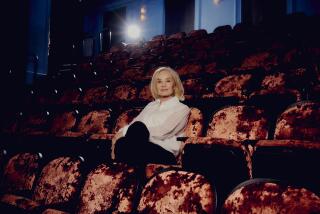TV REVIEW : Paul Linke Drama on Birth and Death Moves to HBO
- Share via
Home birth. Home death. Home Box Office.
“Time Flies When You’re Alive,” Paul Linke’s moving monologue about the home births of his children and the home death of his wife, arrives on Home Box Office Sunday at 10 p.m.
Stock up on handkerchiefs.
The piece was nurtured at the Powerhouse and Tiffany theaters, in Santa Monica and West Hollywood, and the staged version, directed by Mark C. Travis, was indeed a little powerhouse. But it’s even more of one now, in Roger Spottiswoode’s screen version.
The show celebrates the idea of marking life’s most important passages, surrounded by your loved ones in your own environment. So it’s perfectly appropriate that people should watch it in their living rooms, surrounded by family.
But it’s not a trendy tribute to the cocooning of couples and families. Its fundamental subjects are elemental. And Linke’s presentation is spellbinding.
The screen version opens with an exterior shot of Linke’s Mar Vista house. The same image is later used as a framed background during the studio-shot monologue. But before we see Linke himself, John Bailey’s camera (Bailey also shot the Spalding Gray monologue “Swimming to Cambodia”) moves slowly through Linke’s house. We see objets d’art and signs of children, but no people. Ravel’s “Pavane Pour Une Infante Defunte” plays in the background.
Leaving the house, we enter a stage on which Linke stands before an audience. He welcomes us “to an evening with me,” which may strike those who haven’t seen his show as self-indulgent. Who is this Paul Linke?
As he begins talking, however, it quickly becomes apparent that Linke’s story is a human interest story in the best possible meaning of the term--if you’re human, you’ll be interested.
From the beginning, Linke announces that the story ends with the death of his wife, Francesca, in 1986. She realized, too late, that the lump in her breast was not related to breast-feeding.
But it’s also the story of a couple trying to support each other through a crisis and occasionally failing, of a woman’s aversion to conventional medicine and her search for alternative treatments, of children’s attempts to comprehend the incomprehensible.
It even includes an amusing side trip back to the
day when Linke bought himself a colonic for his birthday. Throughout, Linke is never far from self-deprecating humor. Nor is he ever far from gut-wrenching passion.
Although Linke’s words never sound arty, his performance is definitely artful. He is an actor. This is not a rambling therapy session. Yet the authenticity is unmistakable. It helps that the sight of the studio audience disappears after the first few minutes, never to return. Although it’s only an illusion that Linke is speaking to each of us personally, it’s an illusion that becomes harder to avoid, as the show goes on.
His performance has been expertly choreographed, lit and shot. Sometimes Linke speaks quickly, literally commanding “jump cut” as he switches scenes. Sometimes he pauses to allow the impact of his words to sink in. When he utters the doctor’s initial verdict, he is flooded with harsh, intimidating light; the birth of his child brings on another kind of glow.
The visual virtuosity (and some trimming of the text) imparts an urgency to the performance that surpasses the stage version.
Time flies when you’re watching “Time Flies.”
More to Read
The complete guide to home viewing
Get Screen Gab for everything about the TV shows and streaming movies everyone’s talking about.
You may occasionally receive promotional content from the Los Angeles Times.






